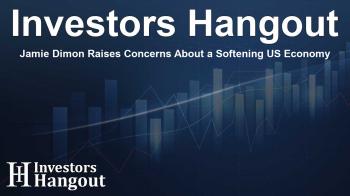Jamie Dimon Raises Concerns About a Softening US Economy

Jamie Dimon's Insights on the US Economic Landscape
CEO of JPMorgan Chase, Jamie Dimon, has recently voiced his apprehensions regarding the state of the U.S. economy, particularly in light of the Labor Department's substantial revision in job data. This news has stirred discussions about the potential trajectory of economic growth.
Signs of a Slowing Economy
Impact of Revised Job Data
In a statement, Dimon emphasized the apparent signs of a "slowing down" economy. The Labor Department's adjustment of nonfarm payroll figures revealed a decrease of 911,000 jobs compared to prior estimates, marking the most significant correction in over 20 years. This revision aligns with what many economic analysts anticipated, causing concern regarding the labor market's vitality.
Consumer Confidence and Spending
Despite most consumers maintaining their employment and continuing to spend, Dimon pointed out a potential decline in consumer confidence. He remarked on a paradox of strong corporate profits juxtaposed with wavering consumer security.
Federal Reserve's Role in the Economy
Dimon suggested that the Federal Reserve might consider a reduction in its benchmark interest rates during upcoming meetings. However, he expressed skepticism about whether such a move could substantially influence economic conditions.
Concerns Over Job Market Stability
Job Growth Overstated
The unexpected adjustment in job data has raised alarms about the robustness of the U.S. labor market, with the Bureau of Labor Statistics releasing figures indicating that job growth was overstated by 911,000 positions in the preceding year. This situation has escalated criticism of the Federal Reserve's monetary policies.
Political Response to Economic Concerns
President Donald Trump criticized the central bank for its perceived delays in addressing economic issues and questioned the potential efficacy of their responses. This political discourse further complicates the public's understanding of economic health.
Dimon's Historical Warnings About Inflation and Recession
Past Predictions on Economic Shifts
Historically, Jamie Dimon has warned of recession risks, particularly in the wake of President Trump's tariff policies, which Dimon referred to as "Liberation Day" tariffs. His annual letters to shareholders have consistently highlighted the inflationary pressure derived from these tariffs and their implications for both imports and the domestic market.
Inflationary Consequences Ahead
Dimon has articulated concerns that the economic landscape might trigger inflation that affects both imported and domestically produced goods, as rising input costs and increased demand heighten pressure on prices.
Market Reactions and Stock Performance
As stock markets respond to these unfolding economic realities, notable indices have shown significant year-to-date increases. The SPDR S&P 500 ETF SPY and the Invesco QQQ Trust, Series 1 QQQ have climbed 11.24% and 13.77%, respectively, as market participants adjust to the economic signals presented by industry leaders like Dimon.
Conclusion
In summary, Jamie Dimon's reflections on the U.S. economy underline crucial trends that could define economic conditions moving forward. A combination of revised job data and shifting market dynamics compels stakeholders to remain vigilant as uncertainty looms over the economic horizon.
Frequently Asked Questions
What did Jamie Dimon warn about regarding the US economy?
Jamie Dimon expressed concerns over the U.S. economy showing signs of weakening, particularly after significant job data revisions.
How did the Labor Department's job data change?
The Labor Department revised the job count down by 911,000, marking the largest adjustment in over 20 years.
What potential action did Dimon suggest the Federal Reserve might take?
Dimon indicated that the Federal Reserve might cut interest rates in upcoming meetings.
What was the impact of Trump's tariffs according to Dimon?
Dimon warned that Trump's tariffs could lead to inflationary pressures on both imported and domestic goods.
How have stock indices like SPY and QQQ performed recently?
Both the SPDR S&P 500 ETF (SPY) and the Invesco QQQ Trust (QQQ) showed notable year-to-date increases of 11.24% and 13.77%, respectively.
About The Author
Contact Evelyn Baker privately here. Or send an email with ATTN: Evelyn Baker as the subject to contact@investorshangout.com.
About Investors Hangout
Investors Hangout is a leading online stock forum for financial discussion and learning, offering a wide range of free tools and resources. It draws in traders of all levels, who exchange market knowledge, investigate trading tactics, and keep an eye on industry developments in real time. Featuring financial articles, stock message boards, quotes, charts, company profiles, and live news updates. Through cooperative learning and a wealth of informational resources, it helps users from novices creating their first portfolios to experts honing their techniques. Join Investors Hangout today: https://investorshangout.com/
The content of this article is based on factual, publicly available information and does not represent legal, financial, or investment advice. Investors Hangout does not offer financial advice, and the author is not a licensed financial advisor. Consult a qualified advisor before making any financial or investment decisions based on this article. This article should not be considered advice to purchase, sell, or hold any securities or other investments. If any of the material provided here is inaccurate, please contact us for corrections.

